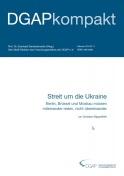According to a recent survey published by the Foundation for Democratic Initiatives, 48 percent of Ukranians interviewed at the end of December indicated that they would vote in a referendum for Ukraine’s accession to the EU (which was not under discussion), while 36 percent were against it. At the same time, 47 percent welcomed the agreements signed with Russia on December 17, 2013, while 28 percent rejected them. According to another questionnaire carried out by two prestigious institutes at the end of December 2013, some 80 percent of those interviewed in the western part of Ukraine supported the protests, while in the east of the country support was at 30 percent and in the south just 20 percent.
Past election results and the present geographical distribution of protest activities send a clear signal: Ukraine is internally divided. Maybe that is why Ukrainians have been implementing a see-saw policy between East and West since 1991 – ever since they gained their independence from the Soviet Union. The country needs intensive and relaxed relations both with Russia and the West.
President Yanukovych’s motives
There is strong evidence that Viktor Yanukovych – apart from ideological issues – never seriously intended to side with the West. Even if the Association Agreement had been signed, Brussels would only have been prepared to provide a few hundred million euros in support. The International Monetary Fund, on the other hand, demanded a 40 percent increase in natural gas prices within Ukraine for their loan. Both Brussels and the IMF had quite good reasons for their reluctance, since Ukraine requires very profound structural reforms.
Last autumn, it looked like a severe economic crisis lay ahead and that Ukraine was only a matter of months away from bankruptcy. In 2013, the current account deficit of the country was 8 percent of economic performance, while the yield on Ukrainian government bonds was too high to be sustainable for very long. Ukraine needed billions, otherwise Yanukovych would lose the presidential elections in early 2015.
The Kremlin clearly demonstrated that Ukrainian goods would no longer have free access to the Russian market if Ukraine signed a Free Trade Agreement with the EU, which would aggravate the economic problems of Ukraine even more. The message from Russia was understandable, but the Kremlin delivered it in a rough manner.
From the end of November on, the haggling behind the scenes began. Kiev was intent on driving up the price. Vladimir Oleinik, a confidant of Yanukovych, warned on December 15, 2013 in the German magazine Spiegel that Vladimir Putin wanted to re-build the Soviet Union. At the same time, he invited the West to be generous. The impending competition between bidders put Moscow under pressure. On December 17, Russia made an offer to buy up to 15 billion dollars worth of Ukrainian government bonds and, among other things, it granted a gas price discount for the equivalent of 3 billion dollars for 2014. In total, this was about 10 percent of the Ukrainian GDP. Ukraine was thus saved from bankruptcy. The Ukrainian leaders joined the side that was willing to give the most. And that was Moscow – because Ukraine has a much greater emotional and economic significance for Russia than it does for Brussels. The West was not prepared to provide the needed financial support for Ukraine.
Does Moscow now have Kiev eating out of its hand?
The Ukrainian-Russian agreement on the gas price reduction is only temporary. So Russia could withdraw the loans it has granted and force Ukraine back into bankruptcy. Is Kiev not very wary of provoking Moscow’s indignation? Obviously not: Ukraine has made it very clear that it will not be joining the Customs Union of Belarus, Kazakhstan, and Russia, which was established in recent years.
Both Ukraine and the EU want to continue their negotiations for the Association Agreement. In short: Moscow is giving Kiev billions simply for Ukraine to continue postponing these plans. This is extremely controversial in Russia. With loans that gain interest at a rate of 5 percent, Russia is only receiving about half of the market interest rate, which is currently around 10 percent for Ukraine.
If Moscow reclaimed the funds it has spent, there would be two outcomes: either Ukraine would go bankrupt, or IMF funds, for example, would appear in place of the Russian billions. In the first case, Moscow would not only lose its funds but would also be considered the cause of the country’s ruin (and of the resulting severe economic crisis). Result: Not only would the money be gone but anti-Russian sentiment would increase significantly. In the second case, Russian billions would be replaced by Western monetary credits, so that the West would be seen as saviors – ruining the reputation of Russia with its friends in Ukraine.
Russia is in no position to reclaim the loans it has made, and cannot even threaten to do so – or even suggest such a threat. Kiev has been given free rein. In consequence, as President Putin stated at the EU-Russia summit at the end January, the agreements with Ukraine were valid for Russia regardless of the current struggle in Kiev. “We shall abide by this decision, even if the government is led by the opposition,” said Putin.
Protests
Since the end of November there have been massive public protests in Ukraine, the extent of which were unexpected – not only by Ukrainian leaders. The protesters are demanding political reforms within their country for understandable reasons, and they are hoping, by supporting the Association Agreement, to give new impulse to these reforms and the prospect of EU membership. For some of the demonstrators, the protests are also motivated by nationalist, anti-Russian feelings.
In Ukraine, as in other countries, the head of state and parliament are legitimized by elections. Through years of negotiations with the Ukrainian leadership, the EU has documented that they do not question this fact. Nevertheless, new elections of the parliament and the head of state, as well as legislative passage of constitutional reforms, could be necessary to end the violence and prevent the complete disintegration of public order.
Both long-term experiences and the developments of the past few months, however, show that a new round of voting will not change anything in the fundamental division of the country. Even a “pro-European president and a pro-European” majority in parliament would have to take this into account.
This is especially the case since the EU will inevitably disappoint any expectations. Ukraine’s accession to the EU is namely not on the table, and probably won’t be so for decades to come. Nor will Brussels be providing the billions that the country needs.
Western-Russian tensions are deepening the divisions in Ukraine
Both sides support “their” camp and tend to deny the other side any moral integrity or legitimate interests.
Many Western and Russian voices, moreover, encourage the representatives of “their” camps to take a tough stance. This has contributed significantly to Ukraine’s descent into the worst crisis of its history and even jeopardized its national integrity. Ukraine is basically not able to move toward the West or toward the East. A move in either direction would threaten its very existence – at least as long as the West and Russia are considered to be competitors, or even enemies, in the post-Soviet era.
Fortunately, there are still some level-headed voices to be heard. At the end of January, the German foreign minister, Frank-Walter Steinmeier, warned that Ukraine could not find its way into the future if force were used, regardless of which side it came from. By contrast, many other politicians have been categorically making their demands to the other camp.
The way out of the dilemma
Beginning in November 2013, Ukraine had repeatedly proposed leading trilateral talks involving the EU, Russia, and Ukraine. Russia agreed to the proposal. Critics argued that Moscow would receive a “right of veto” in European affairs, but the argument does not hold. Kiev is not capable of unilaterally turning either to the East or to the West for economic and political reasons. And the EU is not prepared – and is indeed unable – to take on real responsibilities for the economically stricken Ukraine. So it would be better to work together.
Foreign Minister Steinmeier stated in December that Ukraine should not be “torn” between East and West. He expressed his opinion that Kiev should avoid a unidirectional orientation. Chancellor Angela Merkel rightly called to let go of the “either/or situation” with regard to Ukraine.
Russia’s second-tier politicians have been pouring oil on the fire for months, but some positive signals have come from Russian leaders. At the EU-Russia summit in late January 2013, President Putin reiterated the proposal to create a free trade area between the EU and the Customs Union composed of Kazakhstan, Russia, and Belarus. In the event that this should actually come about, Ukraine would no longer be in the predicament of having to move, or be pulled, in one or another direction. Instead it would find itself in the midst of the largest free trade area in the world. Russian Foreign Minister Sergei Lavrov emphasized on February 1 at the Munich Security Conference that his country was a partner of both Ukraine and the EU.
The EU and Russia agreed at the summit meeting to form a bilateral expert group to analyze the economic consequences of the intended EU Free Trade Agreement with Ukraine. This is a good move. But it is not enough. It is imperative that West act together with the East to exert a moderating influence on the players in Ukraine – and to stand by the country as it establishes a viable political and economic order. Otherwise there is a risk of serious distortions in Ukraine, with significant and lasting effects for their neighbors as well as repercussions in the relationship between the West and Russia.
Berlin, Brussels, and Moscow must develop a practical method for cooperation, or at least coexistence, in the post-Soviet area. It is high time to talk about the legitimate interests of both sides without going over the heads of others.
Russian and Western “containment” policies
Tensions between Russia and “the West” have had massive repercussions within Russia. Were the population ever to think that the West wanted to isolate their country, or that it would be happy to see Moscow’s foreign policy in trouble, this would greatly weaken those in Russia who support those values that are often called “Western.” Western hawks, by encouraging this East/West divide, are in fact playing into the hands of those in Russia who use the excuse of a kind of “Russian exceptionalism” to suppress the growing internal demands for more democracy, greater transparency, less corruption, and more respect for human rights in their country. A common de-escalation policy with regard to Ukraine would not only improve the prospects for solving other problems but would also have a soothing effect on the domestic political climate within Russia.

